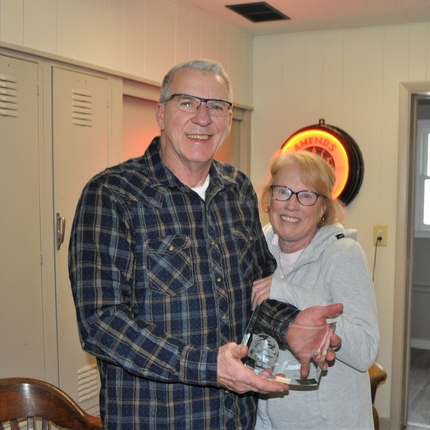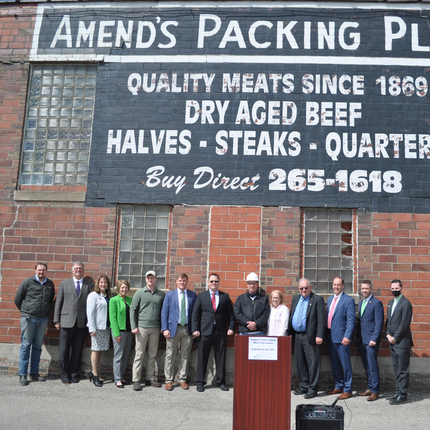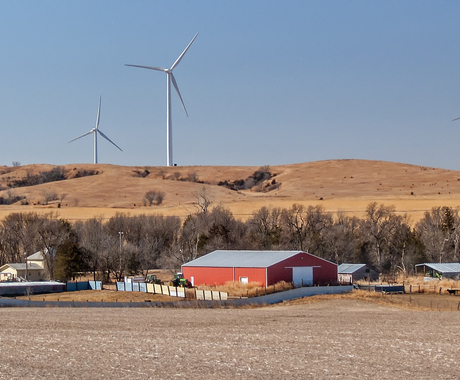By Teresa Hoffman, former staff member
Time sometimes creeps up on Kent Wiese, who has been working in the meat processing industry in Des Moines, Iowa, since 1976.
Kent couldn’t help but reflect on those years when he learned he was the recipient of the Center for Rural Affairs’ 2021 Citizenship Award.
“It seems like just yesterday I started doing this kind of stuff,” said Kent, who co-owns Amend's Packing Company with his wife, Amy. The company opened in Des Moines in 1928. “When you get an honor like that, you stop and think, ‘Oh my gosh, I’ve been doing this kind of work for 46 years.’”
The Citizenship Award is given to an individual or individuals who actively participate in the civic process for creating public policy, and who work closely with the Center to advance public policies that strengthen family farms, ranches, and rural communities.
Kent was honored for his efforts to raise support for House File (HF) 857—legislation that supported Iowa’s small meat processors. In 2021, with support from Center staff, he hosted a press conference at his facility and later took legislators and attendees on a tour. He also made calls and advocated to his local decision-makers, and he did several television and media interviews.
“Kent has been a strong advocate at the state level for small meat processors in Iowa,” said Johnathan Hladik, policy director for the Center. “The press conference Kent hosted helped generate energy for the legislation, and soon after, HF 857 passed without opposition.”
Kent’s advocacy work didn’t stop there. After the bill was signed, he was appointed to the Artisanal Butchery Task Force, a group created by the legislation to study challenges in the industry.
“It was good to talk to other locker members, and beef and pork producers,” Kent said, noting there were also two representatives from community colleges and a culinary arts professor on the task force.
Among the group’s recommendations, which are being considered by Iowa lawmakers this session, is the establishment of a community college butchery education program to help train the next generation of meat processors.
While Kent was raised in a small town where “everybody did this kind of work,” that may not be the reality for everyone interested in the industry. Even those who come from bigger plants need training to work at an operation like his.
“Most people working in big plants know one thing,” he said. “In a little locker, you learn everything. I had the best teachers because these butchers who were in the 60s and 70s taught me how to do it. I’m still learning things.”
The need to have a well-trained workforce became apparent during the COVID-19 pandemic, which highlighted many long-standing challenges faced by Iowa’s small meat processors. As meat supplies at grocery stores dwindled at the start of the pandemic, Kent said people were turning to local meat lockers for their purchases. So were producers looking to get their animals processed when work paused at the larger regional packing plants.
The urgency was evident by the number of phone calls his business got.
“Amy just said today that the phone had only rang six or seven times so far,” Kent said recently. “Back in Covid, it was six and seven times every five minutes. Those lines were going. People were desperate to get meat and get their animals in here.”
Kent and his staff worked 65 to 75 hours a week to fill custom orders.
“We did everything we could possibly do,” he said. “I would go home at 6:30 and be in bed at 7 and be back down here at 4. Whoever wanted to work, I told them they could whenever they wanted because we are just going to be cutting every day. I had a good crew and still do.”
At times, he said, it was a challenge to take care of everybody’s needs, but they wanted to do what they could to make sure people had something to eat.
Being an advocate and voice for meat processors has been a rewarding experience for Kent. He said he liked being part of a grassroots effort and working with Center staff.
“I talked to several producers, and they absolutely love the Center,” he said. “They really think the Center has done a lot for small producers and farmers.”
He was also pleased that some Iowa lawmakers, including Rep. Chad Ingels, who championed the passage of HF 857, took the time to visit his facility for the press conference and tour.
“It made me feel good that they were here and listened to what we had to say,” he said.
Kent, who retired and closed Amends for about seven months before opening back up again in early 2019, said processors are starting to regain their footing. He also is confident the community college program will be established.
“They’ll get it going, I know they will,” he said. “I know it will work if they can get students to do it. Not just somebody who wants to go into the meat business, but producers need to get in. If they want to market animals, they need to take this community college meat class.”
Feature photos - Top: Kent Wiese with his wife Amy. Bottom photo: A group of Iowa lawmakers and meat processors gather after a 2021 press conference at Amend's Packing Company






